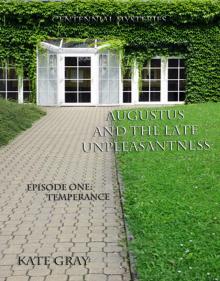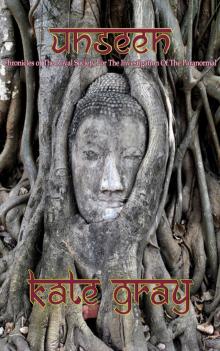Unseen: Chronicles of the Royal Society for Investigation of the Paranormal Read online
unseen
kate gray
Kate Gray
Copyright © Kate Gray 2012
"To my wonderful hubby, and two (lucky for them) adorable boys for putting up with frozen dinners while I worked on this. Many thanks as well to my volunteer readers (R&K), who quieted some of my fears. And to Mrs. (Haakonsen) Jorgensen for telling me I could write in the first place."
“We should worship lord Shiva so that we are freed from our worldly attachments just like a fruit falls from a tree after ripening. Once we are successful in doing this we are liberated from this vicious cycle of life and death.”
-Yajur Veda
Sunset was a welcome visitor, as it ended a particularly warm day for late January. The dim light of a pipe glowed in the creeping dusk, mingling its sweet earthy scent with the smells of cooked food.
Dozens upon dozens of canvas shelter halves were pieced together, housing that many more soldiers. It was a vaguely organized shanty town of the usual sort, with men playing games of chance or various instruments in the idle evening hours.
During the daytime, they all sweated through their drills, saw to their various duties, and generally behaved in the manner expected of them.
Major Gordon Macconnach tried to concentrate on completing his evening rounds, wishing all the while that he might be able to do so in his shirtsleeves rather than the infernal woolen uniform his rank demanded.
Decorum at all times in front of the men, Lord Wellington would have said, but that illustrious man had left this simmering climate to bring Europe into rein.
He and the polished upper ranks had clearly forgotten what life was like in this part of the world. What reasonable officer could hope to maintain a sense of separation from his subordinates without decorum, they would say.
Macconnach would say decorum mattered little when the officer was at risk of fainting in front of his men.
Separation, indeed, thought Macconnach darkly. Despite his rank, Gordon Macconnach had long felt separate from his fellow officers. In fact, Macconnach likely would never have attained his current status without his family’s monies. That, and being singled out as a man who bore further prodding and elevation.
He stumped through the various barracks lanes, winding in and out of the sheltering tents, which served as temporary housing until the fort could be completed. Billeting was difficult enough to come by with the constant influx of troops.
Men lazed about in the close evening air, swatting flies away with horsehair tied to musket ramrods. Most were entirely out of uniform, heating their rum rations bare-chested. Macconnach wondered that Lord Abington didn’t seem to mind the lack of decorum in the midst of the ranks.
He’d cautiously broached the subject only once, to which Abington had smiled beneficently. "My boy," he’d said in that mellifluous way of his, "we must always choose our battles according to the likeliest outcome." It was, in reality, a decision based on numerous possible outcomes.
“With those men out there," he’d swept a long arm in the direction of the barracks, "many of them are conscripts at best, criminals at worst. Very often they’ve come from the most terrible circumstances our fair isles have to offer. I have learnt never to judge a man’s worth by his pedigree, and as such, I have allowed the men to have their own head on many matters. So long as they appear every morning at the call, fight like tigers at my side, and never raise a hand against their friends, we shall never have a problem."
Macconnach had noticed that Abington refrained from commenting on the other obvious reason for letting the men wallow in a false sense of comfort, one which lingered in the background of every military man’s existence.
The truth was that Abington’s men typically flourished under his singular method of discipline. Punishment was meted only when it was deservedly wanted; it never exceeded the measure of the transgression. He granted the men their evenings for liberty, so long as they policed themselves, and never abused his trust.
He worked tirelessly to ensure that their pay arrived in a timely fashion, and that all their records were kept, pristinely, at the fingertips of his highly efficient quartermaster. These men understood, finally, that the duty of their general was not only to direct their motions into the chaos of a battle, but to be their advocate and protector.
In return, any one of them would willingly die in his place. Their loyalty was unquestioned, unimpeachable. It extended so far that Abington’s only daughter could pass through the camp at any hour of the night or day, and proceed without fear of molestation. Again, this was a due borne of fidelity, not of fear.
Not that Macconnach had met her yet. She’d only returned to India some few months ago, having been attending to her mother’s deathbed. It had grieved Abington no end to let them go, some matter of a year before.
Lady Abington’s health had deteriorated badly in the heavy climate, however, and her return back to England had been insisted upon. She had fallen into extremely poor health. None of the physicians’ practical medicine could remedy her from the ague she had acquired while doing her charity work.
Lord Abington had also returned briefly to the Hampshire country manor belonging to his family; long enough only to attend to his wife’s burial, and to fetch his daughter back with him.
Isabel herself had been overjoyed to return to India, Abington had confided in Macconnach; she enjoyed the warm weather, and spoke Hindi and Bangla like a native.
Officially, he had to disapprove of her gadding about the countryside like an urchin, but there was no dissuading her. She had her father’s temperament, just as her brother, Alexander, had his mother’s.
Macconnach found himself pondering the mysterious Isabel Alderton. She apparently enjoyed frequenting the tent "town" housing the enlisted men. Not to flaunt, mind, all the men were quick to assert, she passed through quite often to take dictation for the somewhat illiterate population.
Letters home were a luxury, and even better, those same men proclaimed with childlike excitement, she would read the replies aloud to them. She was also known for her theatrical readings of Jane Austen or T.L Peacock.
Best of all, she knew every name for every face, and always asked after kith and kin. She was an extension of her father, Macconnach theorized, cultivating true admiration in normally deeply suspicious and hard hearts.
She had thus far avoided the officers’ billeting, their dining areas, and anything to do with the elevated ranks. Lord Abington tended to chalk it up to good sense, knowing how puffed up young leftenants and captains could be.
He’d been one himself once, in a far away place. It was only too easy to recall the fancies those young men undertook to appear more than they were. Gambling, dueling, and too many gins later, and those same fools would lend themselves to whatever woman was convenient. It was not at all the future he thought his daughter wanted for herself.
That was the odd part, thought Macconnach. The man didn’t appear to give a fig about certain proprieties where Isabel was concerned. Never mind that she would never be able to make her own way into the male-encrusted pinnacles.
He only wanted her to pursue her own whims, and choose her own life. He trusted in her intellect. He would seemingly let her select her own husband, for her own reasons. She was to read whatever she liked.
Pursue whatever causes she liked. All he ever demanded from her, as he demanded from his men, was honesty, courage, and good judgement.
A shout broke through Macconnach’s reverie, and he whirled in time to see a young Irishman dance in joy at having
finally won a hand at cards. His companions cursed him affably, thumping him on the back, telling him to sit down already and lose the rest of his money.
Macconnach smiled. He admittedly liked the peaceful nights that Abington’s rule afforded. He was still passing a paternal eye over the crowded camp when he spotted s shadowy figure moving in the dark, about five hundred meters or so off to the northeast.
He began to fumble for his spyglass, realizing belatedly how dark it had gotten since he’d begun his walk. Hearing the perimeter guard give a shout, he dashed over the distance, and arrived just as the private went stumbling into the shrubbery.
He had a short distance to cover, however, as a very rough mud brick wall sat in his way. A thump and muttered expletive later, the perturbed private returned to his post.
"What was it? Did you see?" Macconnach had no trouble summoning up the

 Augustus and the Late Unpleasantness, Episode One
Augustus and the Late Unpleasantness, Episode One Unseen: Chronicles of the Royal Society for Investigation of the Paranormal
Unseen: Chronicles of the Royal Society for Investigation of the Paranormal Carry the Sky
Carry the Sky